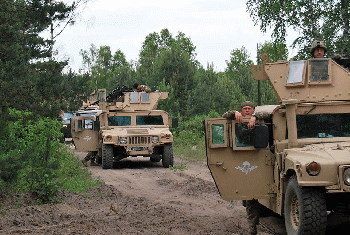
Polish-Ukrainian combined unit conducts tactical training in defence and counterattack
(Image by Ministry of Defense of Ukraine from flickr) Details DMCA
The ongoing Russian invasion has torn asunder whatever passed for geopolitical stability in Eastern Europe in the years since NATO expansion brought Poland and the three former Soviet Baltic Republics of Lithuania, Latvia and Estonia into its membership.
While peeved, Russia had accepted the resulting equilibrium with stoic grace, bristling at every NATO effort at muscle flexing, but not overreacting. Even in the face of NATO and EU intervention in the affairs of Russia's neighbor and ostensible ally, Belarus, in the aftermath of a contested August 2020 presidential election and sustained border crisis over immigration policy, Russia kept its cool, reining in Viktor Lukashenko, the impetuous Belarussian president, while trying to calm the situation with the four NATO members in question.
The Russo-Ukrainian War has changed this equation with Poland and the three Baltic States using the conflict as an excuse to trigger Article IV of the NATO Charter to call for consultations among the NATO membership regarding a situation the four Eastern European nations view as a pressing national security matter.
The article states simply:
"Article 4
The Parties will consult together whenever, in the opinion of any of them, the territorial integrity, political independence or security of any of the Parties is threatened."
Defensive/Offensive Alliance
NATO is an ostensible defensive alliance whose core tenet of collective self-defense is enshrined in the oft-cited Article V of the NATO Charter. While NATO has been engaged in several conflicts in the past 30 years, however, none of them involved invoking Article V.
Indeed, the collective defense clause has only been used once, in the aftermath of 9/11, when, at the insistence of the United States, NATO recognized the terrorist attack as a triggering moment.
The invocation of Article V was, however, more about political theater than genuine collective defense with NATO deploying several airborne surveillance aircraft over North America as well as assembling a small flotilla of ships in the Mediterranean Sea.
The real meat behind NATO's actual use of military force in a combat environment has historically been Article IV - it was invoked to justify the dispatch of NATO troops to lead the Implementation Force (IFOR) and Stabilization Force in Bosnia and Herzegovina (SFOR) in the 1990's; NATO aerial assault on Serbia and related deployment of troops into Kosovo as part of the Kosovo Force (KFOR) in 1999; the deployment of NATO troops to Afghanistan as part of the International Security Assistance Force (ISAF) in 2001; the deployment of a training mission to Iraq in 2004 and the aerial bombardment of Libya in 2011.
While some of these missions had a legitimate peacekeeping function, at least three (the bombing of Serbia, the intervention in Afghanistan, and the bombing of Libya) were offensive in nature and associated with regime change policies.
The situation confronting Poland and the three Baltic States today in Ukraine is one that resonates across NATO and Europe - how best to respond to a Russian invasion that threatens fundamental principles of sovereignty and respect for international borders that had, in theory at least, served as the foundation of European peace and security since the end of the Second World War. (The case of the creation of Kosovo, carved as it was from the territory of Serbia, serves as an uncomfortable exception to this European narrative.)
Despite NATO's decades-long courtship of Ukraine, and the fact that the Ukrainian military had been transformed into a virtually interchangeable part of NATO through a massive training and equipping operation that saw thousands of NATO troops rotate through Ukraine on an annual basis and thousands of Ukrainian troops operating alongside NATO forces abroad, the reality was that, as a non-NATO state, Ukraine could not benefit from the collective defense protections offered by actual NATO membership. That is something both President Joe Biden and NATO Secretary General Jen Stoltenberg have repeated several times before and after the Russian invasion.
(Note: You can view every article as one long page if you sign up as an Advocate Member, or higher).





